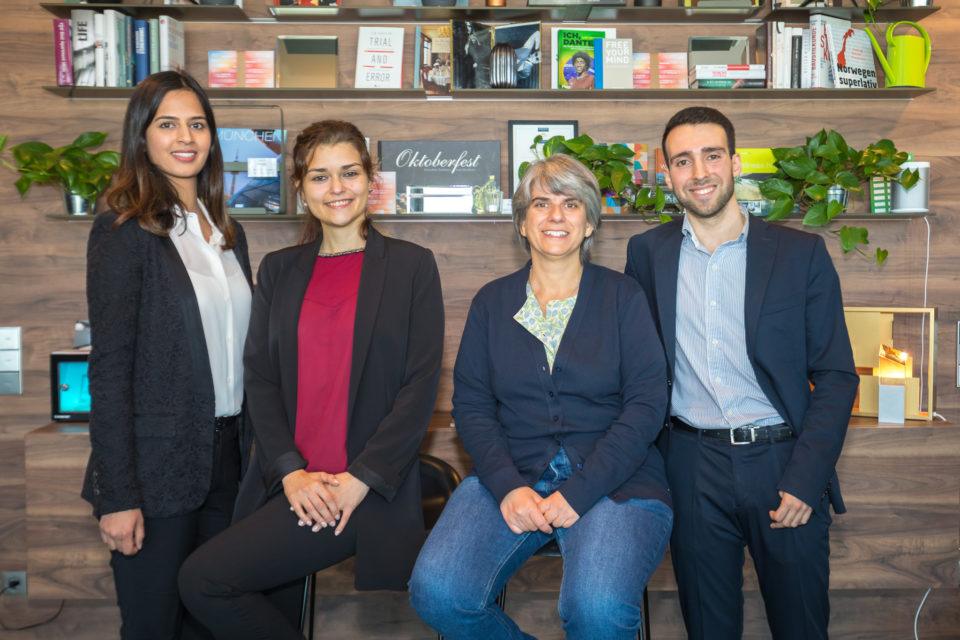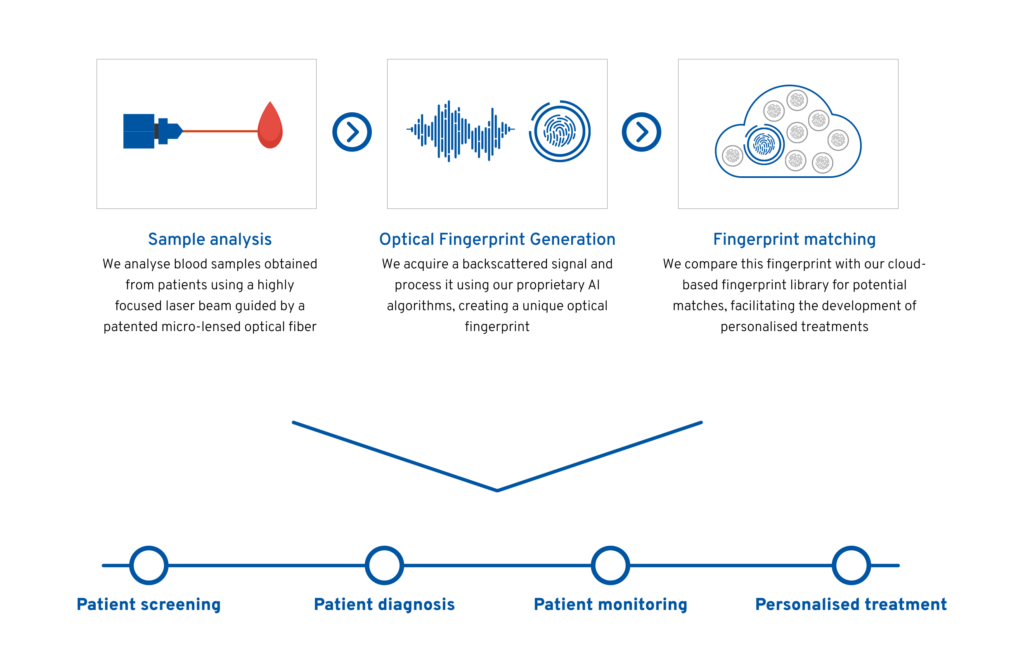
Company of the Month: iLoF
iLoF’s intelligent cloud-based platform hopes to usher in a new era of personalised therapies. The company is using artificial intelligence (AI) and photonics (generating, controlling and detecting light, in healthcare settings, to observe molecular details in cells and tissues, as well as for cell-based therapies), to facilitate personalised and precision medicine applications.
Two of the company’s four co-founders have been named in Forbes’ 30 Under 30 for Science and Healthcare list, and in 2020 the company was listed as one of the top 150 digital health start-ups worldwide by CB Insights. We spoke to Co-Founder and COO, Mehak Mumtaz, about why iLoF is one to watch.
History
In early 2016, approaching the end of her PhD, Co-Founder and CTO Joana Paiva spotted the potential for commercialisation of AI and photonics to differentiate and stratify patients in oncology. Together with Paula Sampaio (Co-Founder and CSO) and Luis Valente (Co-Founder and CEO), she began working to bring the technology to market. The three joined the Wild Card accelerator programme in 2019, and it was here that they met fourth co-founder, Mehak, who explains:
“That programme was really what kick-started the company. Not only did it bring the four of us together, but we had three great months of mentorship, workshops and the opportunity to talk to over 100 different stakeholders and experts in healthcare, pharmaceuticals and technology from all over the globe. Ultimately it led to us securing an investment from EIT Health for €2 million which led to us formally starting the company in August 2019.”
The funding allowed the founders to focus full time on the company, as well as to begin hiring. They now have a team of around 16, operating their tech and engineering centre from Porto, Portugal, and their commercial headquarters from the University of Oxford’s startup incubator, Oxford Foundry.
Tackling the blockbuster approach to drug development
The problem iLoF are working to tackle is that the blockbuster approach to drug development assumes that all patients with a particular condition respond similarly to a given drug.
“This approach doesn’t take into account the fact that diseases are driven by a very complex interaction of our biological makeup and many diverse pathological and physiological processes in our bodies. These mechanisms and processes not only vary between patients who have the same disease, but they also vary within an individual patient, as they get older, and their body changes. So, in order to improve how we treat disease, it’s important that we start thinking about diseases molecularly, and that we define their many different forms and subtypes, instead of considering a complex disease as one single entity.”
The team identified Alzheimer’s Disease as a complex disease with no disease modifying drug on the market yet, despite numerous attempts. They set out to improve the way clinical trials recruit patients for Alzheimer’s treatments by using their technology to develop a cloud-based intelligent platform for identification of disease biomarkers (characteristics) and biological profiles.
The technology
By combining AI and photonics, iLoF are generating a new type of biomarker, which they call ‘optical fingerprints’. Unlike current – potentially invasive and painful – screening techniques, the iLoF test comprises a minimally-invasive blood test. This is then analysed using a highly focused laser beam to generate the ‘optical fingerprint’, which is compared with the wider fingerprint library they have generated.

The process itself is startlingly simple and inexpensive – Mehak points out that it takes under 30 seconds to complete, there is no multi-million-dollar laboratory equipment involved and it doesn’t require the use of consumables like antibodies, or even labels.
“It makes this approach a completely revolutionary approach, with the potential to disrupt the way screening and clinical trials are conducted, and even allow for personalised therapies for the mass market,” says Mehak.
The company is now partnered with a number of different biobanks, academic institutions, researchers and hospitals to build their library of fingerprints and accompanying patient data, which allows them to identify specific biomarkers. These can inform applications ranging from disease detection to prediction of how a patient’s disease will evolve, and what treatment will work best for that patient.
Disease agnostic
The team’s initial focus was on Alzheimer’s Disease because of the current invasive methods used, and lack of success to-date in clinical trials. For this application they have completed a proof of concept, and are currently working with multiple hospitals in clinical studies to test the accuracy of the system against other gold standards.
Mehak points out, however, that the platform is not tied to one particular disease or biomarker, and they have already pivoted to use it for COVID-19. Along with their clinical partners, they have developed the product to forecast, at the point of diagnosis, the clinical evolution of a COVID-19 infection for a given patient. This aims to help doctors identify high-risk patients and inform their proper treatment and care. After being tested in hospitals in Portugal, they have just secured support from the European Commission to scale the product for use across Europe.
Accelerating development
Having only formally started the company in late 2019, iLoF has made rapid progress. Mehak credits a number of programmes with helping them achieve this. Following their kick start through the Wild Card accelerator, joining the Oxford Foundry was a crucial moment, as the connections they forged helped them secure their first client. Since then, they’ve been part of Microsoft for Startups, Google for Startups, P4 Precision Medicine Accelerator, and have also received support from MedCity in receiving feedback and advice, as well as introductions to expert advisors, clinicians and researchers.
“Those connections, made through accelerator programmes and via MedCity, have been incredibly useful. They’ve been the basis of partnerships that we’ve been able to build, as well as providing crucial guidance on the direction we’ve taken,” says Mehak.
Recognition
As mentioned, iLoF’s success so far hasn’t gone unnoticed. From being named one of the top 150 digital health start-ups worldwide by CB Insights, to Joana Paiva and Luis Valente being named in Forbes’ 30 Under 30 List for Science and Healthcare, and winning the Microsoft Female Founders Competition for Deeptech startups, the team have lots to be proud of. Mehak is most excited about seeing their product out in the world, however:
“Being named by CB Insights was fantastic. And winning the Microsoft Female Founders competition was incredible and unexpected, given the number of companies that enter. These are all great validation, but, as founders, what makes you really excited is seeing your technology and your products being deployed in real life. Seeing the COVID-19 tool, that we developed and deployed within six months, out there helping clinicians with their problem-solving. That’s really the kind of thing that drives us. There’s nothing more fun than creating something yourself and then watching it grow.”
Find out more: www.ilof.tech